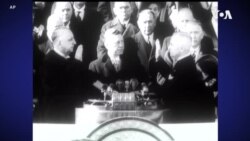America Votes 2020
Why Do People Embrace Conspiracy Theories?
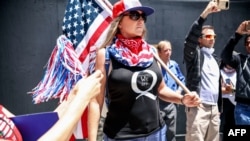
Authorities are still working to determine the identities of the insurrectionists who attacked the U.S. Capitol on January 6, many of whom were apparently motivated by false conspiracy theories that former President Donald Trump won the 2020 election but was cheated out of his victory due to widespread election fraud.
Conspiracy theories often rely on seeing things sharply in terms of right and wrong, and that can drive people to do things they might never have contemplated before, says Peter Ditto, a professor of psychological science at the University of California, Irvine.
“Moralizing things mobilizes people to action,” he says. “If I believed that the American election had been stolen from the rightful winner, I’d probably storm the Capitol, too. It makes perfect sense if that really happened. The problem is, that didn't happen.”
The people most likely to embrace conspiracy theories are less inquisitive and often exhibit narcissistic tendencies, such as an inflated sense of self-importance, a deep need for attention and admiration, troubled
relationships, a lack of empathy for others and fragile self-esteem, according to Emory University research published in the Journal of Personality.
Nika Kabiri, an expert on human decision-making affiliated with the University of Washington in Seattle, says everyone is potentially drawn to conspiracy theories, although some far more than others.
“We're all potentially drawn to them because we all hate uncertainty. We all don't like the idea of not knowing why things happen. It makes us feel like we don't have control in the world. We want closure,” she says. “It's a natural tendency for the human brain to look for those explanations.”
A conspiracy theory is thinking that blames or explains an important event or set of circumstances on a secret plot that is usually masterminded by powerful people. Conspiracy thinking can also embrace the idea that a big secret is being kept from the public.
When a prominent person, be it a movie director or a president, transmits a conspiracy theory, Kabiri says, it is like a super spreader event, and the conspiracy theory gets a lot of exposure.
“People are adhering to these beliefs because they're already dissatisfied,” she says. “They're already unhappy. There's something they want to, perhaps, explain something that doesn't sit well with them, and the story gives them an answer.”
Times of uncertainty, such as a pandemic, can help fuel the spread of conspiracy theories.
“People, in particular, that are susceptible to conspiracy thinking, they’re susceptible to them when they feel threatened and anxious, like a lot of people do right now,” Ditto says. “When the world seems confusing and incomprehensible, which it does right now. When people are lonely and they're seeking connection with others.”
People often latch onto conspiracy stories, because they cannot accept simple explanations for life-altering events, according to Ditto.
A major conspiracy about the 9/11 terror attacks holds that the twin towers in New York fell in a controlled demolition rather than because planes crashed into them.
Unproven speculation about the COVID-19 pandemic holds that the virus escaped from a Chinese lab and was possibly an engineered bioweapon.
Many Americans find it hard to believe that President John F. Kennedy, a larger-than-life political figure, was killed by a lone gunman, a regular guy, which is why they embrace the unproven idea that there must have been a larger conspiracy to murder the president.
The Emory researchers found that the people most likely to embrace conspiracy thinking are often less agreeable and less conscientious, while being associated with a sense of entitlement, grandiosity, depression and anxiety.
“If you are in a close-knit community, either on social media or in real life, with people who are all adhering to the same belief, there's a commitment to that belief that's even more intense than if you just held that alone,” Kabiri says.
Ditto says a million years of evolution pushes people to break into groups with like-minded people.
“We're very tribal. We're very provably attached to people who are like us. It's very, very unusual to have a place where you're supposed to make friends with, and connect with, and cooperate with, people who don't look like you and don't have the same values. Maybe they have a different religion,” Ditto says. “The American experiment, essentially, is an attempt to work against all those evolutionary forces and move people in this positive way where they cooperate. It's way easier to break people up.”
Trump’s Historic Second Impeachment Trial Starts Tuesday
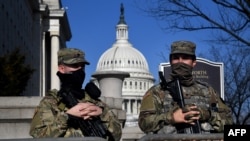
The historic second impeachment trial of former President Donald Trump starts Tuesday in the U.S. Senate, with Trump accused of inciting insurrection a month ago by urging his supporters to confront lawmakers at the U.S. Capitol as they were certifying that Democrat Joe Biden had defeated Trump in the 2020 election.
The protest turned into mayhem, as about 800 supporters of Trump stormed past authorities into the Capitol, smashed doors and windows, ransacked some congressional offices and scuffled with police. Five people were left dead, including a Capitol Police officer whose death is under investigation as a homicide and a rioter shot by a police officer.
The 100 senators — 50 Republicans and 50 Democrats — hearing the impeachment case against the single-term president are in a unique position: many of them were witnesses themselves to the chaos of January 6 as they fled the Senate chamber for their own safety.
With a two-thirds vote needed for conviction, 17 Republicans would have to turn against Trump, their Republican colleague, for him to be convicted, assuming all 50 Democrats vote to convict. As such, Trump almost certainly will be acquitted, just as he was a year ago when he was accused of soliciting the president of Ukraine to dig up dirt against Biden ahead of last November’s election.
Whatever the outcome, however, Trump stands alone in more than two centuries of U.S. history as the only president to be impeached twice.
A week after the storming of the Capitol, the House of Representatives voted 232-197, with 10 Republicans joining all 222 Democrats, to accuse Trump of “incitement of insurrection.” Then, on January 20, Biden was inaugurated as the country’s 46th president and Trump, no longer in power, flew for the last time on Air Force One to his Atlantic coastline mansion in Florida, where he has stayed since.
Trump has declined a request from Democrats to testify in his defense at his impeachment trial and is not expected to attend it. The trial could last a week or longer.
The nine Democratic House impeachment managers bringing the case against Trump — several of them former prosecutors — claim that Trump, by urging his supporters to contest his election defeat at the Capitol, was "singularly responsible" for the riot that ensued.
Trump urged supporters to come to Washington on January 6, saying it would be “wild.” At a rally near the White House shortly before his supporters walked 16 blocks to the Capitol, Trump continued his weeks-long barrage of unfounded claims that election fraud had cost him another four-year term.
At one time in speaking for more than an hour, Trump told his supporters “to peacefully and patriotically make your voices heard” by marching to the Capitol.
But he also exhorted them, saying, “Our country has had enough. We will not take it anymore and that’s what this is all about. To use a favorite term that all of you people really came up with, we will stop the steal.”
“And we fight,” he said. “We fight like hell and if you don’t fight like hell, you’re not going to have a country anymore.”
Ahead of the trial, the House impeachment managers said in a legal brief, "President Trump's responsibility for the events of January 6 is unmistakable" and that the former president's "conduct must be declared unacceptable in the clearest and most unequivocal terms," even though he is no longer in office.
The U.S. Constitution allows for the removal of officials found guilty of “high crimes and misdemeanors.” Trump’s two experienced trial lawyers he hired — David Schoen and Bruce Castor — have argued that since Trump is no longer president, and therefore could not be removed from office, his impeachment trial is unconstitutional.
The Senate, however, has conducted impeachment trials of former officials, not allowing them to avoid a trial for possible wrongdoing by resigning, as happened in an 1876 case, or in Trump’s case, by leaving office as his term ended. Moreover, the House impeachment lawyers argue that Trump incited the insurrection and was impeached by the House while he was still in office.
Senator Rand Paul of Kentucky, a staunch Trump supporter, attempted to block the trial on such constitutional grounds, but five Republicans joined all 50 Democrats in voting 55-45 to proceed with the trial. But the vote also signaled Trump’s seeming Republican support for acquittal remains significant, more than enough to block his conviction.
Paul says there is a “zero chance of conviction.” If Trump were to be convicted, the Senate, on a simple majority vote, could bar him from ever holding office again.
On Tuesday, as the trial starts in earnest, lawyers for Trump and the House managers prosecuting him again are expected to debate the constitutionality of holding the trial. But assuming the Senate votes to go ahead with it, House managers would begin to present their case on Wednesday, likely showing some of the clips of hours of videos of the mayhem.
Then the president’s lawyers would respond with his defense. Later in the week, the Senate could debate whether to call witnesses if the House managers decide they want to have witnesses testify how they felt Trump had urged them on to confront lawmakers certifying Biden’s victory.
Trump’s lawyers have mounted a vigorous defense and contend that the former president bears no responsibility for what occurred January 6.
In a brief filed Monday, they contended that the case against him amounts to "political theater" brought by anti-Trump Democrats. Trump’s lawyers suggested that he was simply exercising his constitutionally guaranteed right of free speech when he disputed the election results and argued that he explicitly encouraged his supporters to engage in a peaceful protest.
"Instead, this was only ever a selfish attempt by Democratic leadership in the House to prey upon the feelings of horror and confusion that fell upon all Americans across the entire political spectrum upon seeing the destruction at the Capitol on Jan. 6 by a few hundred people," the lawyers wrote. "Instead of acting to heal the nation, or at the very least focusing on prosecuting the lawbreakers who stormed the Capitol, the Speaker of the House (Nancy Pelosi) and her allies have tried to callously harness the chaos of the moment for their own political gain.”
In response, the House Democrats prosecuting Trump said, “We live in a nation governed by the rule of law, not mob violence incited by presidents who cannot accept their own electoral defeat.”
“The evidence of President Trump’s conduct is overwhelming,” the managers wrote. “He has no valid excuse or defense for his actions. And his efforts to escape accountability are entirely unavailing. As charged in the Article of Impeachment, President Trump violated his Oath of Office and betrayed the American people.”
Impeachment Charge Against Trump to Be Sent to Senate Monday
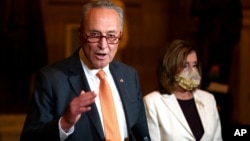
U.S. House Speaker Nancy Pelosi on Monday will send an article of impeachment against Donald Trump to the Senate, Democratic Majority Leader Chuck Schumer said Friday, beginning a trial at which the former president could be convicted of inciting an insurrection at the U.S. Capitol.
"There will be a trial,” Schumer said on the Senate floor. "It will be a full trial. It will be a fair trial.”
Democrats rejected Republican Senate Minority Leader Mitch McConnell's request to delay Trump’s impeachment trial until next month on the ground that Trump’s legal team needs more time to develop a defense strategy.
Trump is the first U.S. president to be impeached twice and the first to go on trial after leaving office. Schumer did not say when Trump’s second impeachment trial would begin, but if he is convicted of the single charge of incitement of insurrection, he could be barred from holding federal office again.
GOP reservations
A conviction would require at least 17 Republican Senate votes, but to date only a handful of Republicans have indicated they would consider convicting Trump, and most have questioned the legality of trying a president after his term has ended. Republicans also have complained a trial would be divisive and distract the new Biden administration.
As preparations for the trial continue, Schumer and McConnell, the Senate’s majority leader until Democrats narrowly won control earlier this month, are vying for advantage in the evenly divided Senate, where Democrats now have an edge because of Vice President Kamala Harris' tiebreaking vote.
Shortly before the January 6 insurrection that resulted in the deaths of five people, Trump told thousands of supporters at a rally near the White House to “fight like hell” against his election loss, which Congress was in the process of formally certifying.
Thousands of his supporters marched to the Capitol and hundreds of them broke in, delaying the certification of the results. A Capitol Police officer was among those who died in the rioting. The House impeached Trump one week later, with the support of 10 Republicans who joined Democrats in voting to impeach.
Young Poet Draws Attention During Biden Inauguration

Twenty-two-year-old poet Amanda Gorman made headlines and dominated inauguration talk on social media Wednesday after speaking at President Joe Biden’s inauguration.
Her poem, in part:
“We, the successors of a country and a time,
Where a skinny black girl,
Descended from slaves and raised by a single mother,
Can dream of becoming president,
Only to find herself reciting for one.”
Gorman, who was named the Youth Poet Laureate of Los Angeles at just 16, is by far the youngest to have read an inaugural poem in recent U.S. history.
In a nod to the late poet Maya Angelou, who read a poem at former President Bill Clinton’s inauguration in 1993, Gorman wore a caged bird ring gifted to her by media mogul Oprah Winfrey.
“I have never been prouder to see another young woman rise!” Winfrey wrote on Twitter.
I have never been prouder to see another young woman rise! Brava Brava, @TheAmandaGorman! Maya Angelou is cheering—and so am I. pic.twitter.com/I5HLE0qbPs
— Oprah Winfrey (@Oprah) January 20, 2021
Gorman’s poem, “The Hill We Climb,” also included a nod to the popular musical “Hamilton,” prompting public praise from its creator, Lin-Manuel Miranda.
“You were perfect. Perfectly written, perfectly delivered,” the composer wrote on Twitter.
You were perfect. Perfectly written, perfectly delivered. Every bit of it. Brava! -LMM
— Lin-Manuel Miranda (@Lin_Manuel) January 20, 2021
In an interview with The New York Times, Gorman said she had written just a few lines of the poem when a pro-Trump riot stormed the Capitol on January 6. Gorman said that after the violent event, she finished the poem in one night.
Earlier in the ceremony, pop icon Lady Gaga gave a theatrical performance of the national anthem. Country singer Garth Brooks sang “Amazing Grace,” and Jennifer Lopez performed a medley of “This Land is Your Land” and “America the Beautiful,” interjecting lines from the Pledge of Allegiance in Spanish.
Trump Flies to Florida as Biden Inaugurated
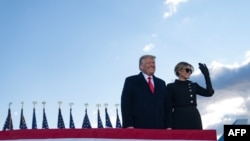
In the fleeting minutes before the inauguration of his successor, Donald Trump was able to enjoy the perquisites of the presidency for a last time — an escorted motorcade moving slowly through the streets of Palm Beach, Florida, as he waved from behind the windows of an armored vehicle to hundreds of supporters waving banners, cheering his name and some urging him to run again in 2024.
Trump was accompanied home by the now former first lady Melania Trump, a small number of still-loyal aides and a dozen members of the White House press corps, which he had collectively during his tenure derided as "fake news" and "enemies of the people."
The motorcade pulled through the gates of the Mar-a-Lago estate less than 30 minutes before Trump lost the powers of the presidency.
After leaving the White House for a final time, Trump arrived early Wednesday at Joint Base Andrews in Maryland on the Marine One helicopter. He was greeted by the tune of "Hail to the Chief" played by a military band, a 21-gun salute and an invited crowd of about 200 people.
There, for just under 10 minutes, he addressed supporters — a more subdued, casual and condensed version of the stump speech from his frequent Make America Great Again rallies that he had hoped would win him reelection last year.
"I wish the new administration great luck and great success. I think they'll have great success," said Trump without referring to President Joe Biden by name.
Trump, who had been criticized for downplaying the coronavirus pandemic, made a rare mention of the "incredible people and families who suffered so gravely" from COVID-19, referring to it as "the China virus."
The 45th U.S. president promised to "be back in some form" and then concluded his remarks by telling the cheering crowd, "have a good life. We will see you soon."
The Trumps then climbed the steps to Air Force One and turned around to wave several times, before departing for Florida.
Trump, as was the norm for four years, broke with tradition until the very end, not only avoiding Biden's inauguration but still refusing to utter the name of the Democratic Party nominee who was victorious in November's election.
At the moment Biden took the oath of office as new president just before noon at the heavily fortified U.S. Capitol building, Trump was 1,400 kilometers to the south, already inside his Mar-a-Lago mansion, a frequent warm weather retreat during his presidency.
Before he touched down in Florida, Air Force One did a low altitude flyover of the Florida coast to give the Trump family onboard an aerial view of Mar-a-Lago.
Capitol mayhem
Trump's presidency ended in shambles. In its waning days, Trump was impeached a second time, the latter after the House of Representatives, including 10 Republicans, charged him with insurrection. Trump, even out of office, will face trial in the Senate soon.
In a January 6th speech on the Ellipse, with the White House in the background, he exhorted supporters at a Stop the Steal rally to march on the Capitol where lawmakers, led by Vice President Mike Pence, were counting the electoral votes to finalize Biden's victory.
The mayhem caused deaths, injuries and damage resulting in federal charges against more than 100 people — an event many Democrats and others have characterized as an attempted coup.
That event has weakened Trump's grip on the Republican party as many of its key politicians ask themselves whether the former president will help or hurt them in Congressional elections now less than two years away.
Approval ratings
In a Gallup poll released this week, Trump departs with a 34% approval rating, the low point of a presidency that already had the weakest average favorability rating of any since the survey began in the 1940s.
Yet he remains popular among Republican voters, with an 82% approval rating. Despite condemnation from some of his party's lawmakers and even members of his Cabinet who resigned in protest over his post-election rhetoric, Trump is the current front-runner should he choose to run again for president in 2024.
Trump's business partners, from golf tournament partners to banks, are shunning him and he may struggle to remain a billionaire between now and the next presidential election. He has been silenced on social media and could face a slew of legal charges in New York and other states.
COVID-19
In his wake, he leaves behind a pandemic whose global spread he has blamed on China. The infectious disease has killed more than 400,000 people in the United States, far more than any other country has reported.
In the final year of his presidency, Trump himself was hospitalized after becoming infected by the coronavirus. Opinion polls indicate a majority of Americans believe his administration's response made the pandemic worse.
Trump's supporters point to positives achieved by the 45th president, including destruction of the Islamic State caliphate, normalization of the Middle East, criminal justice reform and speeding approval of generic drugs.
Trump Presidency Reaches End

Donald Trump’s four-year term as U.S. president comes to a close Wednesday with a morning departure from the White House and a final flight on Air Force One to the southern state of Florida.
He got a sendoff ceremony with a red carpet, military band, a 21-gun salute and an unknown number of guests in attendance.
Around the same time the flight lands, Democrat Joe Biden will be sworn in as the country’s new leader, with Trump breaking decades of tradition by not attending the inauguration ceremony.
Trump’s future, including any political aspirations, remains uncertain.
“I want you to know that the movement we started is only just beginning,” he said in a farewell video message released Tuesday. “There’s never been anything like it. The belief that a nation must serve its citizens will not dwindle but instead only grow stronger by the day.”
Trump leaves office under the shadow of becoming the first president in U.S. history to be impeached twice, and an unclear start date for a Senate trial on charges he incited a mob of his supporters to storm the U.S. Capitol two weeks ago.
He briefly referenced the assault Tuesday, saying Americans “were horrified” and that political violence “can never be tolerated.”
Trump also listed a number of foreign policy initiatives his administration carried out, including withdrawing from the Trans-Pacific Partnership trade deal and the Paris Climate Accord, negotiating a new trade deal with neighboring Canada and Mexico, and applying tariffs on goods from China.
“We reclaimed our sovereignty by standing up for America at the United Nations and withdrawing from the one-sided global deals that never served our interests,” Trump said. “And NATO countries are now paying hundreds of billions of dollars more than when I arrived just a few years ago. It was very unfair.”
He called being president an “extraordinary privilege.”
In some of his final acts in office, Trump issued pardons and sentence commutations for more than 140 people, including his former campaign chief Steve Bannon.
Trump also rescinded an executive order from the early days of his term that banned officials in his administration from lobbying the government for five years after leaving those jobs, or from ever engaging in activities that would require the former official from registering as a foreign agent. The measure was part of his pledge to “drain the swamp,” or root out corruption in Washington.
Biden’s Rocky Road to Victory
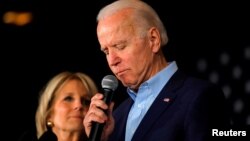
Democrat Joe Biden will realize the ultimate ambition of his lengthy political career on Wednesday when he takes the oath of office at the U.S. Capitol to become the 46th U.S. president.
The theme of the inauguration will be “America United,” reflecting the beginning of a “new national journey that restores the soul of America, brings the country together and creates a path to a brighter future,” according to the Biden-Harris inaugural committee.
But it took the former vice president and senator from Delaware three tries before he finally won the presidency in November. And his final road to the White House proved to be rocky and strewn with unprecedented obstacles.
Biden, 78, was faced with a coronavirus pandemic that sidelined much of his traditional campaigning and forced him to sequester in his Delaware home for much of the campaign.
While touted as the early Democratic frontrunner, Biden stumbled from the start, delivering less-than-stellar debate performances and losing badly in early primary election contests. Finally, as his party’s nominee, he was locked in a brutal general election campaign against Republican President Donald Trump, mocked by Trump as “sleepy Joe” and denounced for policies and his son’s business dealings.
Biden announced his candidacy on April 25, 2019 and he was considered the early front-runner in the Democratic nominating contest.
From the early days of the campaign, however, the former vice president struggled to garner enthusiasm from voters and was soon overshadowed by larger personalities on the campaign trail. There were calls from some Democrats for the party to nominate a candidate who was younger, more liberal and who better represented the growing diversity of America.
Biden was nearly counted out of the presidential race after losses in the first three nominating contests in Iowa, New Hampshire and Nevada, where he placed 4th, 5th, and a distant second, respectively. However, top Democratic officials rallied behind Biden after his win in the South Carolina primary where he received strong support from African American voters and emerged as the clear moderate alternative to progressive candidate Bernie Sanders, the Vermont senator.
Just as it became clear in early March that Biden was again the strong front-runner for the Democratic nomination, his campaign was mostly grounded by the global coronavirus pandemic that unexpectedly and swiftly shut down much of the world.
While Biden eventually returned to a modified campaign trail, he chose to convert many planned rallies to virtual or drive-in events during the general election, in which he faced off against Trump. The president did not make the same decision and continued to hold large, in-person events.
The coronavirus also led to a large number of mail-in ballots for the November 3 election, which in conjunction with close races in several states, slowed down the vote tally and delayed the announcement of Biden as the winner for several days.
President Trump used the delay to bolster his unsubstantiated claims of widespread voter fraud and continued to press his claims through the end of his term, culminating in January, when a mob of pro-Trump supporters stormed the U.S. Capitol to delay the certification of Biden’s win. The attack was an unprecedented assault on the seat of U.S. legislative power and led Biden to describe the mob as “domestic terrorists.”
Here’s a timeline of key events:
April 25, 2019: Biden declares he is running for president, one of more than two dozen Democratic candidates seeking to defeat President Trump.
February 22, 2020: Biden loses the Nevada Democratic primary, after primary losses in Iowa and New Hampshire, and is nearly counted out of the presidential race.
February 29: After winning the South Carolina primary, Biden consolidates the support of Democratic Party leaders and becomes the front-runner for the party’s nomination.
March 3: Biden wins the most number of states in the numerous Super Tuesday primaries, taking the lead in the delegate count and further solidifying his front-runner status.
Spring 2020: The coronavirus pandemic forces Biden to hunker down in his Delaware home for much of the spring, sidelining many of his campaign plans.
June 5: Biden wins enough delegates to secure the Democratic presidential nomination.
August 11: Biden picks California Senator Kamala Harris as his vice presidential running mate, making her the first African American woman on a presidential ticket.
August 20: Biden accepts the Democratic presidential nomination during the party’s convention, held virtually because of the pandemic.
Fall 2020: Biden engages in a pared-down campaign schedule because of the coronavirus, converting many of his rallies to virtual or drive-in events.
November 3: Election Day passes without a presidential winner called because of close races in several battleground states and delayed vote counting due to high numbers of mail-in ballots.
November 7: Major U.S. news outlets declare Biden the winner of the presidential race despite unsubstantiated claims of voter fraud by President Trump.
December 14: The Electoral College cements Biden’s win and the president-elect calls Trump’s attempts to overturn the election an “abuse of power.”
January 6, 2021: A mob of pro-Trump supporters storms the U.S. Capitol, delaying the congressional certification of Biden’s win. Biden describes the mob as “domestic terrorists.”
January 7: Congress certifies Biden’s presidential win.
January 20: Biden to be inaugurated president of the United States.
Harris’ Road to the Vice Presidency
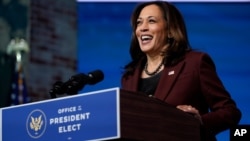
Vice President-elect Kamala Harris is making history as the first African American woman and first South Asian American woman to attain the second-most-powerful job in the United States, yet the campaign that brought her there was bruising at times.
Harris parlayed a career as a California prosecutor, attorney general and U.S. senator to become a top-tier contender in the Democratic race for the presidential nomination, standing out in a field of more than two dozen candidates.
She surged toward the top of the pack after a Democratic debate in June 2019 in which she confronted Joe Biden, one of the party’s long-standing leaders, about his views on race relations. Biden was stunned by the attack in which Harris criticized his opposition to federal busing policies during the 1970s and his working relationship with segregationist lawmakers. He called the attack “a mischaracterization of my position across the board.”
Harris was not able to sustain her climb to the top of the Democratic field, with her poll numbers dropping during the summer and fall of 2019, followed by a decline in donations. She dropped out of the race in December 2019 and endorsed Biden in March 2020 after it became clear he was likely to win the nomination.
Whatever animosity was generated between the two candidates on the campaign trail appeared to vanish as Biden secured the nomination and began a lengthy search for his vice presidential running mate. His selection of Harris brought new political energy to his presidential campaign and was praised by many in the Democratic Party.
Timeline of events
January 21, 2019: Harris announces she is running for president, one of more than two dozen Democratic candidates seeking the nomination to challenge President Donald Trump.
June 27: Harris directly challenges Biden in a Democratic debate about his views on race relations, taking command of the debate stage and propelling herself into the top presidential contenders.
December 3: Following a drop in the polls over the summer and fall and struggles to raise money, Harris drops out of the race.
March 8, 2020: Harris endorses Biden for president, saying she believes the former vice president can unify the country.
August 11: Harris is chosen as Biden’s vice presidential running mate, becoming the first African American woman and first South Asian American woman on a presidential ticket.
August 19: Harris accepts the Democratic vice presidential nomination during the party’s convention, pledging to make America more inclusive.
November 7: Biden and Harris are declared the winners of the presidential race despite unsubstantiated claims of voter fraud by President Donald Trump.
January 20, 2021: Harris is to be sworn in as vice president of the United States.
Notable Names on Trump's Pardon List
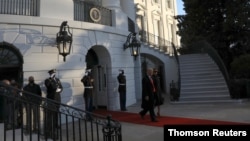
U.S. President Donald Trump issued a flurry of presidential pardons and commutations for 143 people on Wednesday, his last day in office, including his former campaign adviser Steve Bannon.
The people he granted clemency to ranged from rappers to financiers and lobbyists.
The list includes:
Steve Bannon
Bannon, 67, was a key adviser in Trump's 2016 presidential run. He was charged last year with swindling Trump supporters over an effort to raise private funds to build the president's wall on the U.S.-Mexico border. He has pleaded not guilty. White House officials had advised Trump against pardoning Bannon, who left the Trump administration in late 2017.
The two men have lately rekindled their relationship as Trump sought support for his unproven claims of voter fraud, an official familiar with the situation said.
Elliott Broidy
Broidy, a major Republican Party fundraiser, pleaded guilty in October to acting as an unregistered foreign agent, admitting to accepting money to secretly lobby the Trump administration for Chinese and Malaysian interests.
Broidy held finance posts in Trump's 2016 campaign and on his inaugural committee. Prosecutors alleged Broidy received millions of dollars in payments from an unnamed foreign national to try to arrange the end of a U.S. investigation into billions of dollars embezzled from 1MDB, a Malaysian government investment fund.
Kwame Kilpatrick
The former Detroit mayor was sentenced in 2013 to 28 years in prison following his conviction on two dozen charges including racketeering, bribery and extortion from a conspiracy, which prosecutors said had worsened the city's financial crisis.
Kilpatrick, 50, once seen as a rising star in the Democratic Party, received one of the longest corruption sentences ever handed to a major U.S. politician.
Kilpatrick, who was mayor from 2002 to 2008, extorted bribes from contractors who wanted to get or keep Detroit city contracts, prosecutors said.
Rapper Lil Wayne
Lil Wayne, 38, whose real name is Dwayne Michael Carter, pleaded guilty in federal court in December to illegally possessing a firearm and faced up to 10 years in prison. He was scheduled to be sentenced in March in Florida.
A year earlier, the Grammy winner was found with a loaded, gold-plated .45-caliber handgun in his baggage aboard a private plane that had landed at an executive airport near Miami. A previous felony conviction made it illegal for the rapper to have the weapon or ammunition.
On Oct. 29, Wayne tweeted a picture of himself with Trump following what he called a "great meeting" with the president.
Rapper Kodak Black
Black, 23, who was born Bill Kahan Kapri, is in federal prison for making a false statement to buy a firearm, and released the album "Bill Israel" from behind bars.
Black pleaded guilty in August 2019, and three months later was sentenced to three years and 10 months in prison. He is seeking compassionate release.
In a since-deleted tweet in November, Black promised to spend $1 million on charity if the president released him, the hip-hop magazine XXL reported.
Sholam Weiss
Weiss was convicted of bilking $125 million from the National Heritage Life Insurance Co and its elderly policyholders. He fled the United States and was sentenced in absentia in 2000 to 845 years in prison, but he was eventually extradited from Austria.
Weiss, 66, is at a U.S. penitentiary in Pennsylvania, according to the Federal Bureau of Prisons. Trump lawyers from his first impeachment, Alan Dershowitz and Jay Sekulow, sent letters to the White House in support of Weiss.
Anthony Levandowski
Levandowski, a former Google engineer, pleaded guilty to stealing secret technology related to self-driving cars from the company before becoming the head of Uber Technologies Inc's rival unit.
In August, a judge in San Francisco sentenced Levandowski to 18 months in prison but said he could enter custody once the COVID-19 pandemic has subsided.
The judge, William Alsup, who has been involved in Silicon Valley litigation for nearly five decades, described Levandowski's conviction as the "biggest trade secret crime I have ever seen."
Inauguration ...
Inauguration Preview: Wednesday, the United States will inaugurate its next president, Joe Biden, in Washington, DC. Following the violent assault on the Capitol earlier this month by supporters of outgoing president Donald Trump, Americans are bracing for the worst but hoping for unity.
Inauguration History ....
On January 20, former Vice President Joe Biden will be sworn in as the 46th president of the United States. Every four years, Americans pause for this peaceful transfer of power — a potent symbol of American democracy. VOA’s Dora Mekouar reports.
Here's Who Moves Presidents Out of White House

As the presidency of Donald Trump wound down the Thursday before Inauguration Day, the parts of the West Wing accessible to the media looked increasingly vacant.
Boxes and containers were packed with outgoing staffers’ personal belongings. Some White House aides posed for photos in the Rose Garden.
When President-elect Joe Biden is sworn into office January 20 at the U.S. Capitol, another critical component of the peaceful transfer of power will be underway, out of public view, about two miles away at the White House.
Inauguration Day is also moving day at the executive mansion. In just hours, the departing first family is moved out, and the executive mansion is cleaned and prepared for its newest residents.
“The ultimate goal of moving day is to gracefully bid farewell to the president and the first family and to, within five to six hours, flawlessly create a warm, welcoming living space that embodies home for the new president and family,” says Angella Reid, the former White House chief usher who oversaw moving day in 2017.
But moving day could look different this year. Before the Bidens move in, the White House, the scene of at least three COVID-19 outbreaks, will get a deep cleaning. There is no word on when the family will move into the executive mansion.
Planning ahead
Planning for the big day traditionally begins months in advance. The transformation is carefully organized. CNN reports that first lady Melania Trump has already sent several shipments to the Mar-a-Lago resort in Florida where the Trumps are expected to move after the president leaves office.
CNN also reported that White House chief usher Timothy Harleth, who previously worked at Trump’s Washington hotel, is consulting with the Biden team to facilitate move-in day for the incoming president.
Traditionally, the incoming first family chooses furnishings and artwork ahead of the move from the White House’s extensive collection, which is stored in a Maryland warehouse. They will have also noted their personal preferences when it comes to things like meals, snacks, beverages, bedsheets and towels.
Reid describes the day as a tightrope walk.
“It is highly planned for, highly organized and carefully choreographed,” she says. “It's a fast-paced, highly energized, euphoric sort of experience.”
Anita McBride has worked for three presidential administrations. As chief of staff to first lady Laura Bush, McBride knows firsthand what Biden and first lady Jill Biden can expect on Day One.
“When they come into the White House for the first time after traditionally, the inaugural parade, all their clothes are hanging in the closet. All of their personal photos are out in the places where they wanted them to be. It is really an amazing transfer,” she says.
The White House staff does whatever it can ahead of time to facilitate the smooth transfer from one first family to the next. For example, some painting and other upgrades are done when the outgoing president is away for the holidays in late December. But the rest is accomplished on moving day.
Two elevators bear the brunt of moving one president’s furnishings out while the new commander in chief’s belongings are moved in. Some of the bulkier items are carried up and down the stairs.
“There are so many areas that are painted. Artwork has to be changed out. Fixtures are changed, for the bathroom fixtures, lighting fixtures, new beds, new mattresses. Everything,” Reid says. “It's just a lot of moving parts.”
The incoming president makes choices about how to furnish the Oval Office. Most presidents choose to use the HMS resolute desk, given to President Rutherford B. Hayes by Queen Victoria in the late 1800s.
“Interestingly enough, the rug really has a role to play to convey the feelings that a president has or the emotions that they have about sitting in that office,” McBride says. “Of course, the portrait of George Washington always has its prominent place above the fireplace, and virtually no one has changed that.”
White House curators make sure government property does not leave with the outgoing family. Everything is tagged, separating a president’s private property from pieces that belong to the country. Former President Bill Clinton returned $28,000 worth of gifts amid confusion over whether the donated items were given personally to the Clintons or were intended for the White House collection.
Emotional day
Emotions can run high when the staff has to say goodbye to the first family.
“They feel this huge sense of loss, because you have built relationships with a lot of people, and it's finite,” Reid says. “You recognize a day is coming or has come, that these bonds will be severed.”
McBride recalls the emotion of leaving the White House.
“The relationship between a permanent staff and a first family, and particularly if there are children involved, and young children involved, they do become quite close,” she says. “And it's hard for them to say goodbye.”
That sense of loss can extend to people like veteran staffer Dale Haney, who looks after the first family’s pets.
“He is in charge of the grounds,” McBride says, “but he also has had the responsibility of taking care of any family pet. ... It's been a difficult experience for him on moving day when the pets that he's gotten so close to, who were like his family, when they leave with the first family.”
Leaving the White House can be especially difficult for a one-term president, as McBride experienced when George H.W. Bush lost the 1992 presidential election to Clinton.
“You feel a sense of, ‘I didn't get everything done the way that I had hoped,'” McBride says. “When you're leaving after four years, and particularly for a first family, it is emotional. And, you know, George H.W. Bush did say in his memoirs, it hurt. It hurt. And (his wife) Barbara Bush felt it, too. The family felt it deeply, but they also are incredible patriots, and they rose to the occasion.”
For White House staffers like Reid, Inauguration Day can last 21 hours, but the sense of mission and duty to the country overrides any fatigue.
Reid says moving day at the White House is where the peaceful transfer of power truly begins and ends, adding that the dexterity, professionalism and quiet commitment of the residence staff makes the seamless transition possible.
“I think that's a very integral part of the entire day and the launch of the presidency,” she says. “It's such a meaningful and impactful day that nothing else supersedes the necessity of creating a positively memorable experience for everyone involved.”
Senate Republican Leader: Trump ‘Provoked’ US Capitol Rampage
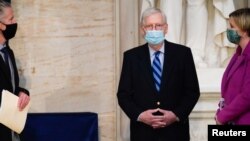
U.S. Senate Republican leader Mitch McConnell contended Tuesday that outgoing President Donald Trump “provoked” thousands of his supporters to storm the U.S. Capitol on January 6 in a futile effort to block Congress from certifying that Democrat Joe Biden defeated Trump in the November election.
“The mob was fed lies” that Trump had been cheated out of reelection, McConnell told the Senate a day ahead of Biden being sworn in on the steps of the Capitol as the country’s 46th president.
“They were provoked by the president and other powerful people,” McConnell said in an unusual rebuke of Trump, a fellow Republican who leaves office Wednesday after a single four-year term.
McConnell said the rioters, who stormed past authorities and into the Capitol building after Trump urged them at a rally to confront lawmakers about the election outcome, “tried to use fear and violence.” But he said that lawmakers refused to give them “veto power over our nation, not even for one night.”
Some of the rioters vandalized the building, ransacked congressional offices and scuffled with police in the mayhem that left five people dead, including a police officer whose death is being investigated as a homicide. More than 100 rioters have been charged with various offenses and McConnell said 275 are under investigation.
Law enforcement authorities eventually restored order and Congress, after hours more of debate, certified Biden’s defeat of Trump in the early hours of January 7.
McConnell said he expects that the “people’s choice of their 46th president” will be affirmed with the inauguration of Biden and Vice President-elect Kamala Harris in a peaceful ceremony at noon Wednesday, even as Trump skips the ceremony and heads instead to his Atlantic coastal mansion in Florida.
A week ago, the House of Representatives impeached Trump for the second time, accusing him of inciting insurrection in the storming of the Capitol. The Democrat-controlled House accused him in late 2019 of enlisting Ukraine to dig up dirt on Biden ahead of the November election. Last February, however, the Senate acquitted him.
A two-thirds vote is needed in the Senate to convict Trump on the insurrection impeachment article, but with the chamber soon to be split 50-50 between Republicans and Democrats, 17 Republicans would have to turn on Trump and join all 50 Democrats in voting for a conviction. If convicted, a simple majority vote could bar Trump from ever again holding federal office.
McConnell, a staunch ally of Trump over the last four years, said last week he would consider convicting Trump but had not made up his mind, although his Tuesday statement appeared to signal he holds the president responsible for the January 6 rampage.
“While the press has been full of speculation,” McConnell said in a message last week to his Republican colleagues, “I have not made a final decision on how I will vote, and I intend to listen to the legal arguments when they are presented to the Senate.”
No date has been set for the start of the impeachment trial, but it is expected to begin soon in the early days of the new Biden administration.
What Happens If a President Refuses to Leave
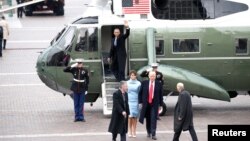
Despite virulently opposing the results of the November presidential election won by former Vice President Joe Biden, President Donald Trump has indicated that he will leave the White House by the time his term ends at noon on January 20.
He will follow in the footsteps of every single one of his predecessors. No president in American history has refused to exit the executive mansion.
But what would happen if one did?
“The principal goal in designing our system was that we not have a monarch with indefinite tenure. The president has a four-year term and if he gets re-elected, great, but if he doesn't, then he goes away,” says Brian Kalt, a professor of law at Michigan State University’s College of Law.
The Constitution, the supreme law of the United States, states that the president, “shall hold his Office during the Term of four Years.”
“And the 20th amendment declares that his term ends at noon on January 20 and the new president takes the oath and becomes president at noon on January 20,” Kalt says. “At noon, this person is not the president anymore ... he's a trespasser at that point.”
What would happen if a president refused to leave the White House?
“After the new president was inaugurated, he would call on the Secret Service or the military to escort the old president out of the White House,” says historian Bruce Kuklick. “And it would happen.”
Besides, occupying the White House does not make a person the president.
“What makes you president is being inaugurated president of the United States as a result of a process of deciding who won the election,” says Kate Masur, an associate professor of history at Northwestern University. “There's nothing in the Constitution that says you have to be literally in the White House.”
Officials throughout the government are crucial to the peaceful transfer of power. Many federal workers, including those in the military, Secret Service and FBI, take an oath to defend the Constitution, which means recognizing the winner of the Electoral College vote.
“The Constitution outlines that there is an Electoral College, and it gives an outline of how a new president is chosen,” Masur says. “And if you refuse to cooperate with the procedures established under that part of the Constitution that lays the framework for how a president is chosen, you are violating your oath of office.”
Historian Kuklick says the weight of political culture and public opinion, rather than specific words in the Constitution, are what prevent American presidents from overstaying their welcome.
“The guy couldn't get away with it and it's not a matter of what's written in the Constitution,” he says. “It's about the conventions of government and the traditions. I mean, there just wouldn't be any support for his doing that.”
Kuklick says democratic traditions like free and fair elections and the peaceful transfer of power are integral to how Americans see themselves. And these dearly held conventions are not something they’d let go of lightly.
“If you're a U.S. national, from the time you've gone to kindergarten, you’ve heard the stories about how the United States operates and the kind of constitutional democracy it is. And in your own lifetime, you've seen presidents lose and go out of power,” says Kuklick. “It's just part of the pageantry and majesty of this constitutional regime … It's born and bred into them.”
Man Seen Carrying Confederate Flag in US Capitol During Siege Arrested
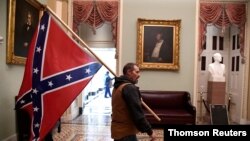
Federal law enforcement officials Thursday say they have taken into custody a man seen in widely distributed pictures carrying a large Confederate flag during last week's siege of the U.S. Capitol by supporters of U.S. President Donald Trump.
Federal Bureau of Investigation (FBI) and U.S. Justice Department officials confirmed Kevin Seefried, along with his son, Hunter, turned themselves into the U.S. Marshalls Service in Wilmington, Delaware, about 174 kilometers northeast of Washington.
Published reports say both Seefrieds will be charged with misdemeanor accounts of trespassing and disorderly conduct, while Hunter Seefried has also been charged with destruction of property.
The FBI had distributed a bulletin via social media and elsewhere seeking information about Seefried, featuring four pictures in which he can be seen walking the halls of the Capitol carrying a large Confederate flag, which goes back to the American Civil War between the North and the South in the 1860s, but has come, in modern times, to represent white supremacy.
Author and Civil War historian John Reeves says the flag known today as the Confederate flag was known as the Rebel battle flag during the war, and was a call to arms for the South, while a sign of treason for the those in the North.
Reeves said the flag reemerged during the U.S. civil rights movement in the 1950s and ’60s as sign of opposition to efforts to abolish segregation and ensure voting rights for African Americans. He said it is common to see white supremacists carry it at rallies.
Reeves said many in the southern United States have argued the flag is simply a symbol of their heritage, but “Black Americans have always known exactly what it stands for.”






